WHEN Daniel Mendelsohn’s 81-year-old father Jay enrolled in his seminar on The Odyssey at Bard College, which was followed by a Greek cruise, they experienced what Daniel refers to as their “own little epic.” Their adventures resulted in a full-length memoir titled An Odyssey: A Father, a Son, and an Epic, recently published by Knopf. In keeping with his hybrid style in previous works, Mendelsohn again combines the personal with the literary and the historical as he elaborates parallels between Homer’s classic work and his own “odyssey” with his father.
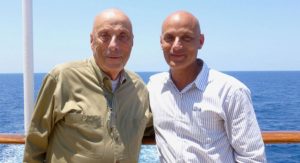
A prolific writer whose seven books include The Elusive Embrace: Desire and the Riddle of Identity (1999), The Lost: A Search for Six of Six Million (2006), and Waiting for the Barbarians: Essays from the Classics to Pop Culture (2012), Mendelsohn may be most familiar to readers for his frequent contributions to The New York Review of Books and The New Yorker. His 2009 translation of the Greek poet C. V. Cavafy’s complete works was a herculean effort about which he has much to say in what follows.
This interview was conducted by telephone in late September 2017. — Frank Pizzoli
Frank Pizzoli: Your father was a retired research scientist who attended your twelve-week seminar on the Odyssey at Bard College. Then, you both went on the Odyssey Cruise. Was that your own epic voyage with your father?
Daniel Mendelsohn: Oh, absolutely. My dad, who was 81, had always wanted to travel. My mother really doesn’t like to travel, and, being a mid-century Jewish couple, he couldn’t imagine doing anything without her. It wasn’t until my father was in his seventies that I started going to international literary festivals and bookstores, and I started taking him everywhere. But this trip was obviously special. And it was certainly our own little epic. That’s when the book came into focus.
FP: Mom doesn’t like to travel?
DM: She’s a stay-at-home mom who is very intelligent and well-read. The travel bug never bit her, although my dad would have liked to travel a lot when he was younger. So I cherished the opportunity to take him along. Basically, the last ten years of his life, wherever I went I took him, and we had a great time. But the Odyssey Cruise was obviously special.
FP: And the parallels are amazing. Both your story and The Odyssey are nonlinear.
DM: Yes, exactly. When we took the cruise I wasn’t planning on writing a book. When he took my class I thought maybe I’d get an interesting article out if it: How my octogenarian father took my Odyssey course. It wasn’t until we were on the cruise, about halfway through, did I begin to think it might be something bigger. As you point out, the whole experience was very nonlinear. I love moving in circles rather than a straight line. Having my father be part of the experience, first in the classroom and then on the cruise, well, after a certain time I realized what I had.
FP: When did you actually start a notebook?
DM: About halfway through the cruise. We started to have these amazing experiences, like going into Calypso’s Cave, or meeting an elderly gentleman with a scar on his thigh just like Odysseus had. In Book 19, when Odysseus returns home, Euryclea, who had been his nurse, recognizes him by a scar on his thigh. When these things started to occur I started getting serious.
And you have to remember that I didn’t know my father would fall ill and die within six months. Of course, I took a break from everything during the months that he was ill and for a couple of months after he died. When I look back at what turned out to be the last year of his life, I realized there was a narrative arc—the classroom, the cruise, the hospital. That’s when I told my agent that this is going to be a book.
FP: Not to reduce your father’s memory to a technical term, but you had a through line?
DM: Yes. We’re both journalists, so I don’t think it’s wrong. Sometimes you don’t know you have a story until you have a certain vantage point. On the cruise I started running back to the stateroom and typing notes. He would ask: What do you think you’ll be doing with this? I’d reply: I don’t know but I think it’s going to be something. I’ve written two other family memoirs, so he knew what I’m about. In that way he became approvingly aware of the book as did some inquisitive passengers who knew I’m a writer.
FP: Any Trojan horses? Did you discuss your gayness? What was your first discussion with him?
DM: My father was the original classicist in our family. We were always talking about gayness. Given the culture in which we were immersed, same-sex relations came up often as a topic. He was totally cool with it. My father was really wonderful when I came out to the entire family. I started out writing for the gay press. My first memoir was very much about that. On the cruise, we hung out with a San Francisco gay couple—a doctor and his partner. One was my dad’s age, the other younger. My father adored them, and we spent most of our time with them. I’m very lucky because my parents were always very cool about my being gay.
FP: Your father witnessed a lot of cultural change over the course of his lifetime.
DM: I’d like to think I educated him over the course of my life. I came to realize that my father could be cruel sometimes when he had emotions he didn’t know how to express. For him, especially when he was younger, his feelings could come out as anger or disdain or even cruelty if he had worries about his children when we were a young family.
There’s a passage in the book about how he treated a gay student when he was in high school—pretty sweetly and gently, actually, and that was the 1940s. But for a Jewish guy from the Bronx of his vintage, he was actually pretty cool about things. It’s interesting to look at men of that generation. My dad was born in 1929, and over the course of my life I realized he was quite a gentle person who didn’t always know how to express it. My parents didn’t bat an eye when I came out in 1980, when it wasn’t a given that you’d fare well.
FP: Did your course help him understand homosexuality?
DM: He read many of the Greek classics before taking my course and was always curious about how things worked. He thought it was interesting. He was highly intelligent, and I explained it all to him.
FP: This blending of the personal and the literary is a hallmark of your work, correct?
DM: Like all my other books, this one entwines two kinds of narratives, one personal and one critical or literary. I’ve done this in all my books now. To me, the most important thing about the experience that led to this book is that even people who haven’t read The Odyssey know it’s about this guy who’s been separated from his wife for twenty years and is madly trying to get home so he can be reunited with her. Having read and taught The Odyssey many times over, and having had two mentors who were both experts on the manuscript, it wasn’t until I had my father in that seminar that I realized the extent to which The Odyssey is actually even more about father and son.
People don’t think of it as a father–son story, but there’s much more real estate devoted to the father–son passages than to the husband–wife situation. How could I not have noticed that before? It’s like looking at The Odyssey with special pair of glasses—a father–son pair—because my dad was sitting right there, and suddenly all this stuff about fathers and sons leapt out at me in a way that had never happened before.
FP: Shifting gears a little, Cavafy’s poetry also leapt out at you. You’ve translated all of his work, correct?
DM: Yes, that book is his complete poetry, every aspect of his verse [CP Cavafy: The Complete Poems, 2012]. It took me twelve years. At the time I started, around 1994, there were not many good translations. There was one that was the standard, and, although it was very good, I felt there were aspects of Cavafy’s poetry that needed to be brought out more, certain formal aspects. For example, some of his poems rhyme, a lot of them are actually sonnets, and you wouldn’t have guessed that by reading previous translations. People don’t realize that, because it’s not something that was emphasized in the standard translations until I started to work on my own.
FP: Earlier translators were heavy-handed in what they removed by de-emphasizing?
DM: But I don’t want to dis anyone’s translation, like Edmund Keely’s work. [Keely was a Princeton professor while Mendelsohn was in graduate school there.] He wanted to bring out the “modernistic” aspects of Cavafy’s poetry, since he was a Modern poet, so that’s what he emphasized. If you’re a translator, you realize that you cannot bring out every aspect of someone’s work. You have to choose your battles. Keely’s translation was the standard published in the 70s. It really brought out the crispness of Cavafy’s work. But I felt that readers needed to know that Cavafy was a 19th- and 20th-century poet who straddled both periods of time. He was interested in forms: sonnets and rhymes. Every translation provokes a response; it’s a seesaw effect.
As a gay person, I felt that there were kinds of nuances that I wanted to communicate. For example, there’s a Greek word for pleasure, hedone. It’s actually connected to our word, hedonistic. It’s the same root in ancient Greek. In Keely’s translation, he almost always translates that one word as sensual pleasure. Why does he have to call it sensual, to distinguish it from what? Being gay, that would never have occurred to me. When Cavafy is referring to sex between men, you know exactly what he’s talking about. I thought he made certain passages a little bit clinical by always referring to male-on-male sex as sensual pleasure. I wanted to de-psychologize it, make it seem more natural. Pleasure is pleasure.
FP: And Cavafy wasn’t hiding anything when he wrote it.
DM: No, which is amazing, given that he was writing in the 1890s and into the 1920s. Nothing cagey, no coding, he never pretended. He was always very straightforward about men having sex with men. I wanted to bring out the matter-of-factness about that.
FP: Literary legend says that poets burn brightest when younger, but Cavafy doesn’t fit that mold.
DM: Cavafy started writing in his thirties and it wasn’t very good. It wasn’t until his forties that started producing a succession of masterful work. I think Cavafy got better and better as he got older. He was only seventy when he died. No one would contest that his work just got richer, more pared down, more expressive, more concentrated as he got older. Americans are in love with the idea of the young genius, the early success story. We anoint young writers who come out of the gate with an 800-page bestseller. In reality, most writers get better as they age, because you know more as you get older.
FP: You and Edmund White have sparred in the recent past. It happened in The New York Review of Books, a journal for which you both write. Can you offer any background?
DM: I reviewed his memoir City Boy: My Life in New York During the 1960s and 70s for NYRB. I expressed the view that he was really concerned more with the writers he mentioned than with their work. I just thought it was kind of a lazy book. I admire a lot of his early writing, but I thought he was coasting a bit in that book. I just didn’t find it very persuasive. Since he is the eminence grise of gay writers, the book should have been better. I think he has been comfortable to be the king of that city. As you become more prominent, you must improve, not rest on your reputation. My question is, Did he give up something when he decided to become the king of gay letters? What was lost when he decided to be the big fish in that pond? In my mind, I want to be in the ocean, not the pond.
I don’t want to criticize him; I was just reviewing his book. I don’t even know him. I met him at a party once twenty years ago at Princeton [where White currently teaches creative writing]. My review may reflect a generational thing. White is twenty years older than I am. I came along at a different moment. For his generation, it was so important for gay writers and their work to be recognized. By the time I started writing in the 90s, it wasn’t that big a thing for a writer to be gay. Today, gay writers don’t have to write about gay things. Being gay now can be secondary to your words. The whole point of being a writer is precisely that you can be liberated to write about whatever you want. With White, I thought he allowed himself to be, chose to be, in a kind of a literary ghetto. It’s still important for gay people to be recognized as writers for good writing, not necessarily for being gay. That’s very important.
FP: You’ve said that writers learn from an intelligent reviewer not necessarily a positive review. What have you learned from intelligent reviews?
DM: You really learn a lot. I really am serious about that as a person who writes books and reviews. Meaningful criticism is beneficial. We all want to be better. No one becomes a creative person for ego gratification. You don’t become a writer to win prizes. The point is we all know a writer has to always be doing his best work. When people point things out, you learn.
I think my new book is by far my best book. Many people read my Holocaust book, a family memoir [The Lost: A Search for Six Million, 2006]. Many people loved that book, and I loved that book too. It was an international bestseller. I tried to do some things stylistically which I would not do now. Some reviews pointed out that I was pushing the envelope a little by my long sentences. I listened to them. I think my writing now is much tighter, less showy in places.
FP: When you’re doing an essay, is it like shaking a bottle of soda and then off with the cap for all the fizz?
DM: I do a tremendous amount of research. I was trained as an academic. One mentor said to me: You can’t write anything until you’ve read everything. So, I can take months to write one of the New Yorker or NYRB essays. I usually try to read everything that seems to me to be germane. You read all of the works by the author you’re writing about and everything all around it—what he read, his influences. I write very fast. All my essay first drafts are complete within a day. I usually wake up at 6 a.m., then start writing at about 7:30 a.m. and go until 6 p.m. It may not be perfect but I like to get everything down. I usually have about 70 to 100 pages of single spaced notes by the time I start one of those pieces. I’ve done all the legwork, and then I let it percolate for a few days after I’ve done all my research. I let it wash over me.
FP: That way you don’t have to go back to look up some factoid.
DM: Precisely. And I don’t know what an essay’s going to be. I never use an outline. Don’t know what the ending is going to be. My discovery goes to the very end.
FP: You’ve been very gracious with your time.
DM: Oh no, this has been so interesting. I wish we could keep going. It’s one of the most interesting conversations I’ve had so far. It’s nice to talk about the other work too but I appreciate the way you’re trying to see my new book in light of my older work. That’s what I try to do when I write about people.
Frank Pizzoli has published interviews with many noted writers. He is the founding editor and publisher of Central Voice.


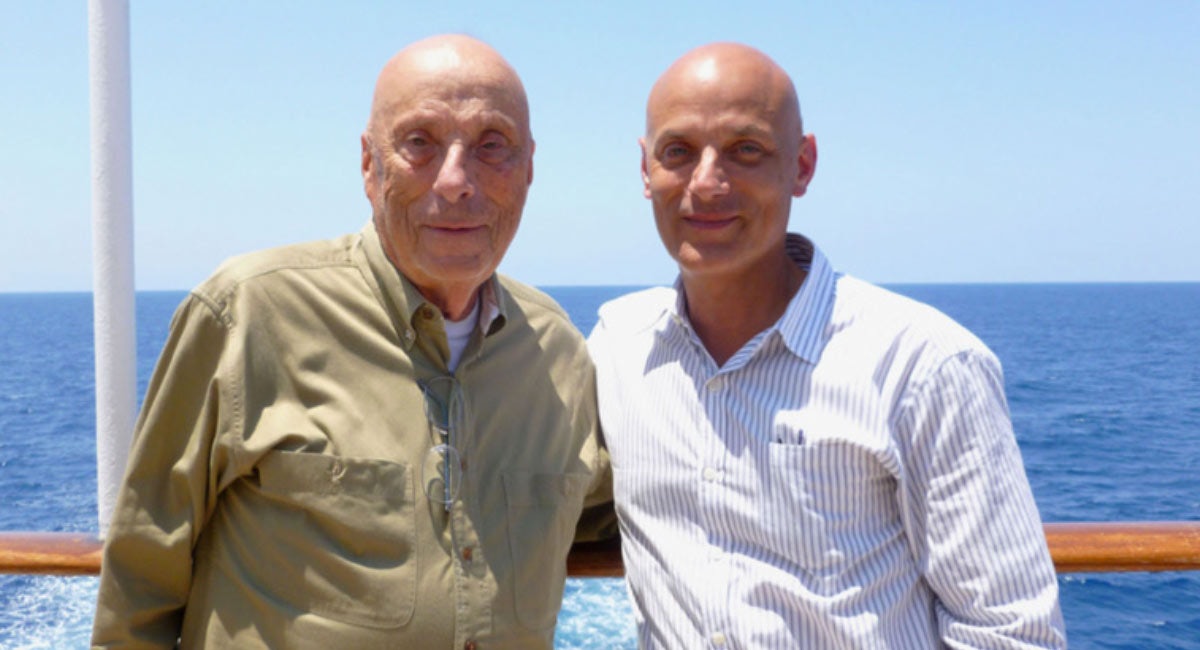

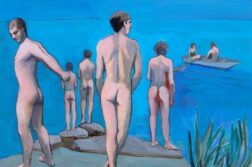
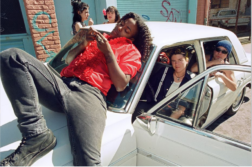
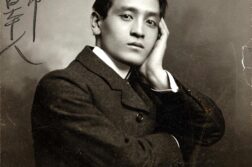
Discussion1 Comment
David Mendelsohn is one of my favorite writers. Nobody is perfect, and so there are some small problems in his work. For example, in a review of the film “Alexander” by Oliver Stone, he mistakes the nudity of Rosario Dawson for that of Angelina Jolie. Was he, and his editors, too highly minded to care about Hollywood trivia? Who cares, really? One of my favorite books of his, to which I go back to again and again, is his recent “Three Circles”. I wish I could be his student, but I am an aging medical oncologist who lives too far away from Bard College.